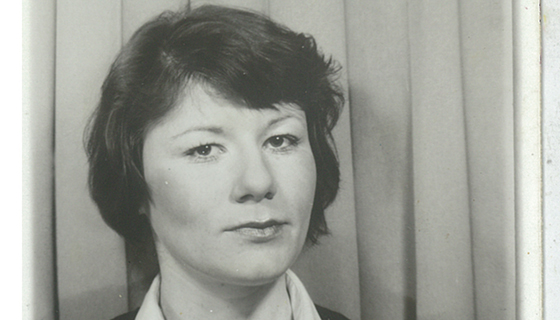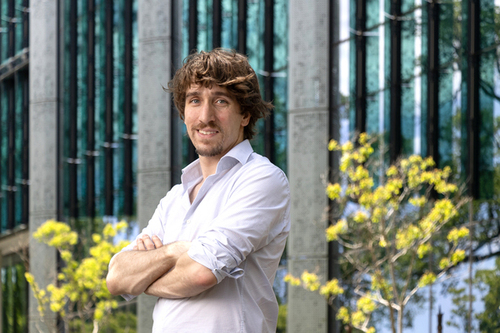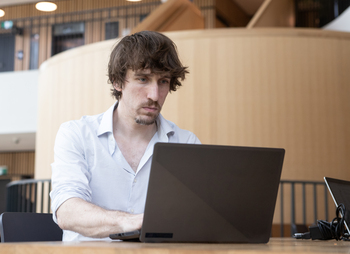Dr Matt Faria knows his ambitious, lifechanging research project was only made possible through the generosity of one donor, Réjane Langlois, who left a gift in her Will to the University of Melbourne.
“Réjane always had a lifelong interest in science, and I hope that the work that I’m doing respects and honours her memory,” said Dr Faria.
Although Réjane was a trained graphic artist, she held a long fascination with the field of biology.
 Réjane Langlois
Réjane Langlois
Her interest in the inner workings of bodies and minds led her to avidly consume books on neurobiology, and she once said she would have liked to be a scientist to understand the brains of birds.
When Réjane was diagnosed with breast cancer later in life, her involvement with the life sciences suddenly became very personal as she underwent treatment.
Although she made a full recovery, Réjane later received a second cancer diagnosis – lung cancer.
It was during this time in her life that Réjane met with University of Melbourne researchers, eventually establishing the Réjane Langlois Fellowship in Biomedical Engineering, as a way of honouring her long-term fascination with science and improving the lives of those facing cancer and other diseases into the future.
The Fellowship provides a biomedical researcher the opportunity to deepen their research over a three-year period and investigate creative ways to expand knowledge in biomedical research.
Accelerating new treatments
Today, Réjane’s wishes for her gift have been granted.
Biomedical researcher Dr Matt Faria is the current recipient of the Réjane Langlois Fellowship, and through Réjane’s generosity, he is working to remove a critical obstacle that medical researchers currently face when developing new treatments.
 Dr Matt Faria
Dr Matt Faria
“The first step in treatment development is researchers coming up with medications that look promising,” explained Dr Faria.
“Then those treatments go to animal trials, most of which don’t work, and those that do go to human trials also have a very low success rate. We have to fix that process.”
Dr Faria’s goal through his research is to develop faster and more accurate ways of understanding the effectiveness of a new treatment in development.
“If we can figure out how well therapies will work on your liver, for example, without having to actually put them into trials, we can increase the speed of getting therapies that really work to patients earlier.”
To achieve this, Dr Faria’s research is specifically focused on improving how we measure the efficacy of targeted therapies that are designed to attack specific, problematic cells in the body.
“The best drug in the world would treat just the disease – no side effects, and no other changes to the body,” said Dr Faria.
“That’s what targeted therapies are trying to accomplish, and that’s what this research is supporting.”
Earlier in 2023, Dr Faria was excited to publish a paper that delivered further insights on how progressive ‘organ-on-a-chip’ experiments behave compared to simpler models.
“Because these organ-on-a-chip models let us understand how parts of your body will respond to new therapies, it’s critically important to be able to quantify how they work and what is different between them and the more common, simpler cell experiments,” he said.
“We’ve also just started a project that will be a big step towards predicting what happens in animal experiments, hopefully without having to perform them.”
Empowering talented researchers
To pursue such bold and innovative research that could revolutionise how quickly and effectively we develop new treatments for disease, Dr Faria knew that he’d need special support.
Typically, funding is granted in isolation to either fundamental or medical research. Fundamental research represents the development of new ideas in a laboratory setting, where medical research encapsulates work that can be applied in clinics and hospitals.
“Receiving a gift that allows me to bridge that gap between coming up with things that look promising and figuring out if they work, I think that leads to better treatments, better therapies, and better possibilities for the future.”

The Réjane Langlois Fellowship has also given Dr Faria the autonomy needed to take his research to new heights in an otherwise restrictive industry.
“It's very competitive out there, especially if you want to pursue something over a long period of time,” said Dr Faria.
“When you give a gift like this, you're funding a person that gets to decide the direction of their research, and that flexibility has led to receiving some grant outcomes from the government.”
Every day Dr Faria continues his research, he honours Réjane Langlois’ generosity and memory.
“I have a picture of her on my desk, and I keep it there because I want to remember why I'm here and who made this possible,” said Dr Faria.
“I would've loved to have lunch with her – she sounds like she was a lot of fun – and I would have loved to thank her in person.”
Learn more about leaving a gift in your Will to the University of Melbourne.